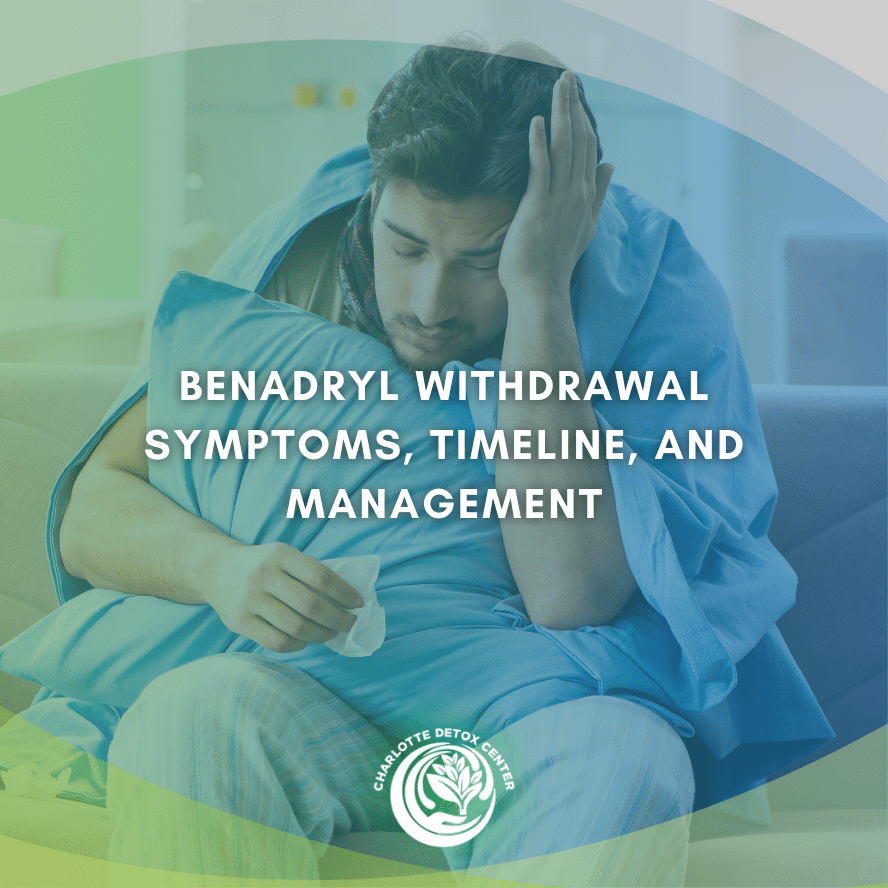Benadryl Withdrawal Symptoms, Timeline, and Management

Medically Verified: 2/1/24
Medical Reviewer
Chief Editor

All of the information on this page has been reviewed and verified by a certified addiction professional.
Benadryl (diphenhydramine) is an over-the-counter (OTC) antihistamine medication used to treat allergy symptoms and allergic reactions. The medication works by blocking histamine, the hormone in the body that causes allergies. Many people are quick to turn to Benadryl when their allergies flare up, but some people use it more often than they should. Although Benadryl is available OTC, there are some risks associated with taking the medication.
Benadryl can produce feelings of relaxation and drowsiness, and in high doses, it can cause hallucinations, delusions, and paranoia. As a result, some people may abuse it or even become addicted to it. Some people begin abusing Benadryl as a sleep aid, taking it every night. Although rare, it is possible to become physically dependent on Benadryl to the point where you experience withdrawal symptoms if you stop using it.
Symptoms of Benadryl (Diphenhydramine) Withdrawal
Occasional Benadryl use will not lead to physical dependence and withdrawal, but people who take it on a daily or near-daily basis may become dependent. Common symptoms of diphenhydramine withdrawal include:
- Insomnia
- Anxiety
- Restlessness
- Irritability
- Flu-like symptoms (watery eyes, runny nose, etc.)
- Confusion
- Nausea
- Vomiting
- Diarrhea
- Increased heart rate
- Sweating
- Tremors or shakiness
- Panic attacks
- Seizures (rare but possible in severe cases)
How Long Does Benadryl Withdrawal Last?
The Benadryl withdrawal timeline can vary from one person to the next depending on factors such as length of use, regular dosage, individual health and metabolism, and more. Most people begin having symptoms within the first 24 hours after their last dose. Symptoms may last a week or longer.
An estimated timeline and what to expect during Benadryl withdrawal is as follows:
- 12-24 hours after the last dose – Symptoms such as anxiety, muscle aches, runny nose, and anxiety may appear.
- 1-3 days after the last dose – Symptoms peak during this time and may include irregular heartbeat, high blood pressure, nausea, vomiting, and diarrhea.
- 4-7 days after the last dose – Symptoms will slowly subside, and most symptoms will be gone by day 7. However, in rare cases, symptoms can last for longer than a week.
Coping With Benadryl Withdrawal
In addition to seeking medical assistance, there are several actions you can take on your own to reduce the severity of diphenhydramine withdrawal, such as:
- Slowly reducing your dose over a period of time (tapering)
- Staying well-hydrated by drinking plenty of water and other fluids
- Eating a healthy, nutritious diet
- Talking to a support group
- Relaxation exercises such as meditation, yoga, or other activities
Is Diphenhydramine Withdrawal Dangerous?
Since Benadryl is an over-the-counter medication, people tend to underestimate the severity of withdrawal, however, diphenhydramine withdrawal is a serious and dangerous matter that must be taken seriously. In severe cases, withdrawal can be life-threatening. Benadryl withdrawal can result in panic attacks, seizures, or hypertensive crises. It can also lead to serious anxiety and mental health-related issues.
It’s impossible to predict just how serious withdrawal will be, and symptoms can change rapidly. As a result, you should always seek help from a drug detox center before stopping Benadryl. Medical detox centers offer safe and controlled environments that can support you throughout the detoxification process.
If you have found yourself in the midst of Benadryl withdrawal, do not hesitate to seek medical attention from your doctor or the ER.
The severity and duration of withdrawal symptoms can vary depending on several factors, including the dosage and duration of use, individual differences in metabolism and health status, and whether the person is quitting cold turkey or gradually tapering off the medication. If you are considering stopping Benadryl or any other medication, it’s essential to talk to your doctor first to discuss the best approach and any potential risks.
Detoxing From Benadryl at a Drug and Alcohol Detox Center
If you are struggling with Benadryl addiction and need to detox safely, you should check into a drug and alcohol detox center near you. Detox centers have medical and support staff available 24/7 to monitor your symptoms, administer medications (in this case, a Benadryl taper), and provide emotional support. Detoxing in this type of setting can eliminate the risk of serious and life-threatening complications.
Detox begins with a comprehensive assessment to determine your needs. Once a treatment plan is devised, you’ll begin detoxing under medical supervision. A Benadryl taper can take several days or weeks depending on the severity of your addiction, so it’s important that your treatment plan is tailored to your situation.
After acute detox, a counselor will help you assess your treatment options and make the right choice for rehab. Your counselor will ensure a smooth transition to a drug and alcohol rehab program.
Find Help for Benadryl Abuse and Addiction
While Benadryl is a useful medication to have in your cupboard, it can be dangerous and physically addictive when abused. If you or someone you love are struggling with Benadryl dependence or addiction, please contact Charlotte Detox Center today to learn about your medically-assisted detox options.
References:
